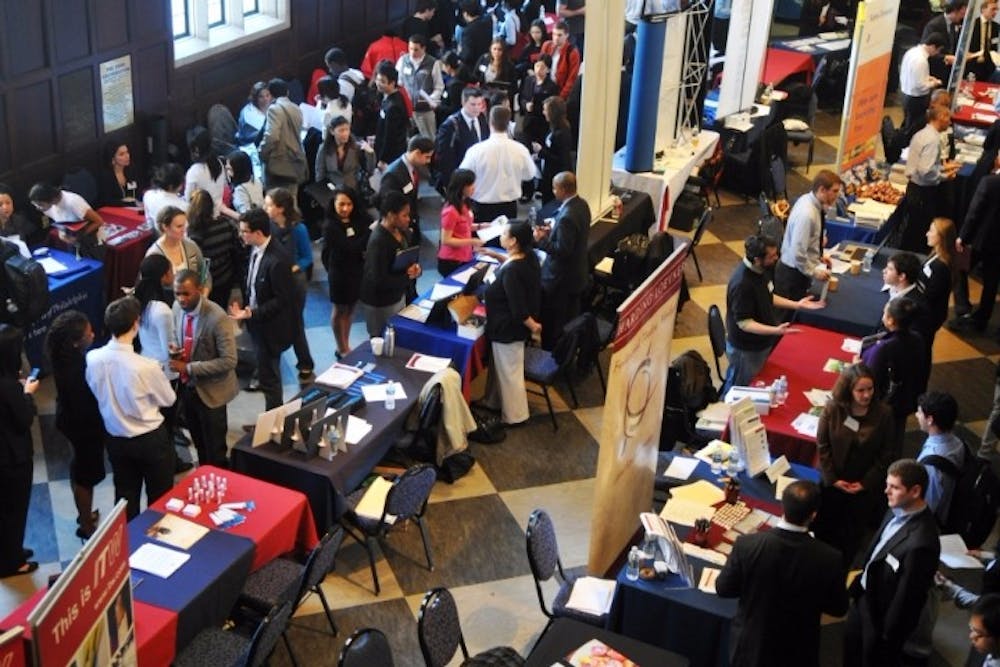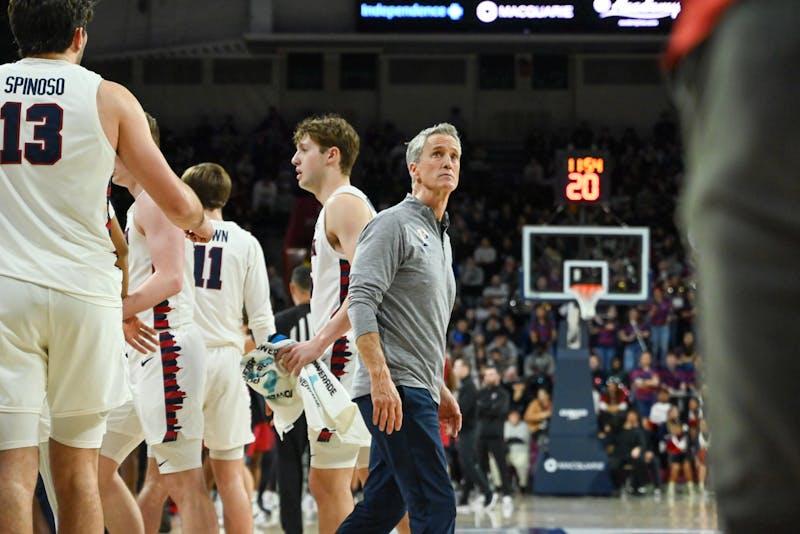
When it comes to recruiting at Penn, three industries dominate: finance, consulting and technology.
Of the 2016 Penn graduates who took full-time jobs after graduation, more than half of them are working in these three industries, with 25 percent in finance, 17 percent in consulting and 15 percent in technology.
In many ways, their appeal seems deserved: jobs in these industries typically pay well and often act as a launchpad for a stable career path. This is not to mention the social prestige associated with a job offer from Goldman Sachs or the Boston Consulting Group.
For some undergraduates, the allure of a prestigious position can outweigh the demands of the job. Some find themselves applying for or even accepting jobs even when they’re not fully sure of what the job entails.
2016 Wharton graduate Anastasia Lee works as an investment banker in the technology division at Morgan Stanley. After beginning work, she found — to her surprise — that much of her time isn’t spent working on finance at all.
“Sometimes you have to [work on] the administrative side of things,” Lee said. “There are things that aren’t necessarily related to finance that you end up helping out with.”
Lee had previously worked at Morgan Stanley as an intern, where she said the company made an effort to provide her with an intensive and exciting experience, placing her on big deals that were in execution.
Now, as a full-time analyst, her job is less deals-focused and focuses more on the setup or planning for such acquisitions. She said she also spends a lot of time providing data or analysis for clients and her superiors.
As students grow more familiar with the pressures of jobs in finance through internships and work experiences, some decide to switch career paths.
“I initially thought I wanted to do finance – because that’s what everyone does,” 2016 Wharton graduate Connie Chen said. After finance internships in Singapore and New York her sophomore and junior summers, Chen landed a job her senior year at a very different company: Google.
“I was really interested in renewables and I knew I wanted to pursue that, but I wasn’t sure what aspect of renewables,” Chen said. “I chose Google because I know that eventually I want to work in some kind of renewable tech, and understanding how a technology company works and runs – one of the largest and [most] ubiquitous companies – I thought would be a great start to that.”
Chen isn’t a programmer at Google; she works in operations. Coming from a business background, she said she had to learn a lot about the technology sector for her new job. This was a learning curve she didn’t face in finance, where she found that her classes had prepared her more thoroughly.
Despite everything she had to learn, Chen said she’s glad to be at Google instead of working in finance.
“I don’t want to make tech seem like the holy grail or the promised land, but I think the differences [between finance and technology] are like night and day,” she said. “In finance, depending on where you work, it can be more hierarchical... and it’s less about you initiating projects than you getting work.”
Innovation is more welcome in the technology sector, she said, adding that individual interests are also more valued.
“I think in tech, it’s very encouraged for you to point our errors or [create] philosophical questions about why something exists to begin with,” she said. “Outside of work hours – or even during work – they encourage you to take your own projects or take courses that you’re interested in.”
The day-to-day life of working in these industries is also far different from life at Penn — Lee said that her job at Morgan Stanley is highly unpredictable and prone to change depending on client’s specific needs.
In other ways, though, her life is much more structured now than when she was a student.
“If you don’t really care about how you do in a certain class, you can just not study for it, and it’s of no real consequence,” Lee said. “But here, because you have real responsibility, and because you’re getting paid for your services, I think it’s really crucial that you manage your outcomes. [There’s] less flexibility and more responsibility.”
Tricia Peralta, another 2016 graduate from the College and Wharton, agreed that a working schedule can be less flexible than student life.
Peralta, who works in McKinsey & Company’s Philadelphia office said that while she has less control over her working hours, it is now more important for her to maintain a work-life balance — especially given the frequent traveling she does as part of her job. Because she typically spends Monday through Thursday out of town at the client’s office, she can sometimes feel isolated on weeknights. Reaching the weekend and “getting her life back” helps her to keep her work and her personal life separate, she said.
“In college, it’s always about going the extra mile and working so much harder,” she added. “But in the workplace, the incremental benefits are not as big anymore” — so there’s less stress to spend her official leisure time working.
Lee said graduating and entering the workforce has influenced her view of college life, as well as a successful life in general.
“The definition of success isn’t [doing] banking after Wharton and private equity after banking,” she said. “A lot of the analysts here think that’s a rat race, and you want to break out of it if you can. Definitely don’t go into banking just to go with the flow or because your peers think highly of your offer.”
She stressed that it is important to get to know the culture and environment of a company before accepting a job offer, and recommended reaching out to other Penn alumni who work there.
Lee added that while investment banking can be a valuable starting ground for people who are genuinely interested in finance, she feels that many Penn students go into finance without thinking about what they want longer term. Seeking or accepting a prestigious job offer may seem appealing in the short term, but eventually the novelty wears off, she said.
“When you actually start working, you don’t wake up in the morning and say ‘oh my gosh, I’m so glad I’m working at Morgan Stanley’ – the reality of the job hits you really hard,” Lee said. “I think it’s important for anyone at Penn to think about what they’re really passionate about.”
The Daily Pennsylvanian is an independent, student-run newspaper. Please consider making a donation to support the coverage that shapes the University. Your generosity ensures a future of strong journalism at Penn.
Donate






